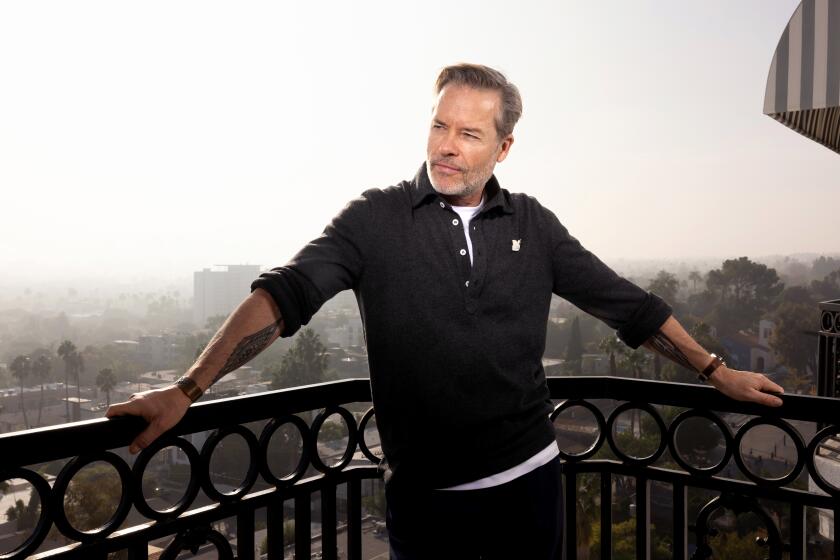Enthralling, commanding, tempestuous
- Share via
“VOLCANIC” is the word for Anna Magnani (1908-73), an icon of international cinema whose renown in the U.S. commenced with Roberto Rossellini’s “Open City” (1945), a raw, jagged, shot-on-the-run panorama of Rome on the eve of liberation that also introduced American audiences to the power of postwar Italian neorealism.
“Open City” (Friday) is the ideal film with which to launch LACMA’s “Mamma Roma: The Films of Anna Magnani,” a 14-film retrospective featuring numerous unfamiliar titles -- and running through Nov. 24 -- that will reveal why Magnani remains one of cinema’s greatest actresses.
As part of “Open City’s” large, mainly nonprofessional cast, Magnani stands out as an impoverished widow, along with Aldo Fabrizi as a severely tested parish priest. Remember, at the time “Open City” was released in art theaters, Betty Grable and Rita Hayworth were our reigning box office queens. By dizzying contrast, here was Magnani, playing an ill-fated pregnant mother, with her hair a mess and circles under her eyes that would deepen with the years to become as much a trademark as her tempestuous personality and protean talent.
“Open City” will be followed by “The Peddler and the Lady” (1943), in which Magnani first played a woman of the people -- a lank-haired fruit seller who bides her time while butcher Aldo Fabrizi pursues a young beauty who will never appreciate all his acts of kindness.
We meet Magnani’s heroine in Pier Paolo Pasolini’s superb 1962 “Mamma Roma” (Saturday) just as she has given up streetwalking, having scrimped and saved for years, to open a produce stand in an open-air Roman market to reclaim her teenage son (Ettore Garofolo), who has been raised in a small town and whom she overwhelms with an almost seductive mother love. The film is marked by extraordinary tracking sequences as Mamma Roma strides through the night, proudly announcing her dreams and feelings to a chorus of passersby.
The second feature is George Cukor’s “Wild Is the Wind” (1957), in which well-meaning but obtuse Nevada sheep rancher Anthony Quinn returns to his native Italy to bring back his late wife’s sister (Magnani) as his bride, assuming she will be “a nice quiet woman” like his beloved Rosanna. Portraying a woman confused in a new world and in a new language, hungry for love and acceptance yet insistent upon retaining her own identity, Magnani is enthralling, ever commanding -- and inevitably drawn to Quinn’s foster son (Anthony Franciosa). (The retrospective will also include Magnani’s other two well-known American films, both Tennessee Williams creations: “The Rose Tattoo,” which earned Magnani an Oscar, and “The Fugitive Kind.”)
The 1952 “Bellissima” (Nov. 10) is one of the finest films in both director Luchino Visconti and Magnani’s careers. Magnani’s Roman working-class housewife is perfectly sensible until she’s conned into believing that with proper training, her woebegone little daughter (Tina Apicella) can be turned into another Shirley Temple. She stirs up plenty of her trademark bombast, yet there’s far more to her stage mother than stereotype. There’s native wit and gentleness beneath the shouting and the familiar gestures. There’s a neorealist disillusionment to Visconti’s view of postwar Italy, but his film is finally a paean to mother love, brought off magnificently by Magnani.
Other known quantities in the series include Mario Mattoli’s “Full Speed” (1934), which will follow the Nov. 11 screening of “Volcano” (1950). It’s an urbane, sophisticated romantic comedy with songs, starring Vittorio De Sica as a shy, pampered professor who finally asserts himself to catch the glamorous Dora (Milly). As Dora’s maid, Magnani is all but unrecognizable with her plucked Merle Oberon eyebrows and marcelled bob, but her vitality still shines through her sleek facade.
After the Nov. 18 screening of De Sica’s “Teresa Venerdi” (1941), in which Magnani, herself a former nightclub singer, has a bit as “the Queen of Jazz,” another of Magnani’s major films will screen, Jean Renoir’s 1952 “The Golden Coach.” Magnani plays Camilla, or La Perichole, tempestuous star of a hardy Italian commedia dell’arte troupe that has endured a five-month voyage to 18th century Peru in hope of bettering its fortunes in the New World. Earthy yet eloquent, Camilla quickly attracts the handsome, dandified viceroy (Duncan Lamont), scandalizing his court with his lavish gift of an exquisite golden coach.
Just as the film seems no more than a light romantic comedy, a feast for the eyes, its perspective broadens, revealing that the artificiality of court life is making a mockery of the notion of civilization in whose name such oppression is meted out to the native population -- a grim reality. Renoir’s vision is too profound to stop at protest and proceeds to offer a meditation on art and life.
Note: There will be free screenings Saturday, Nov. 11 and 18 of the new documentary “Anna Magnani -- Portrait of an Actress.”
*
Mamma Roma: The Films of Anna Magnani
Where: Los Angeles County Museum of Art, 5905 Wilshire Blvd., Los Angeles.
When: Friday to Nov. 24
Price: $5 to $9 per evening.
Contact: www.lacma.org/programs/FilmPrograms.aspxor(323) 857-6010.
More to Read
Only good movies
Get the Indie Focus newsletter, Mark Olsen's weekly guide to the world of cinema.
You may occasionally receive promotional content from the Los Angeles Times.










